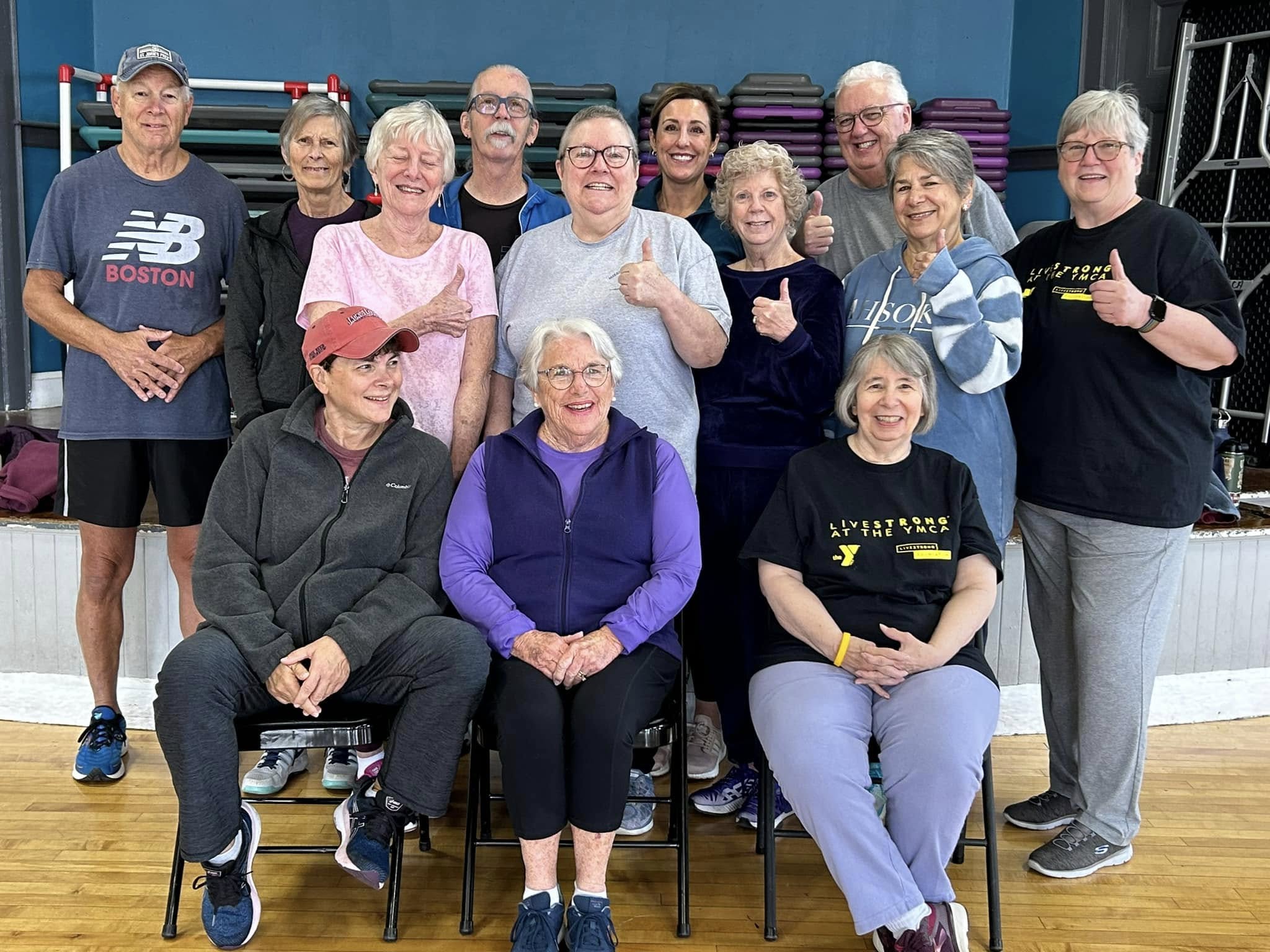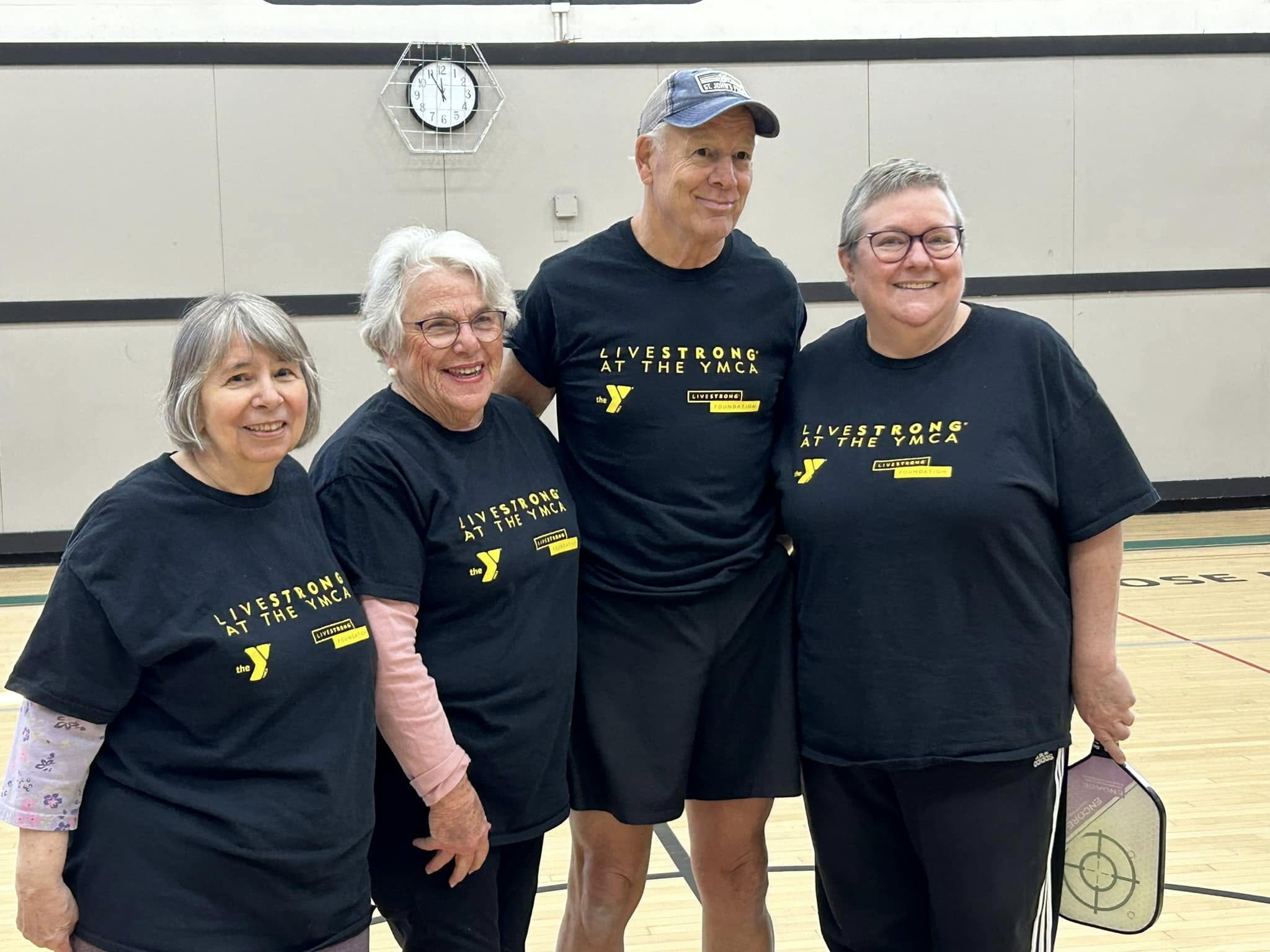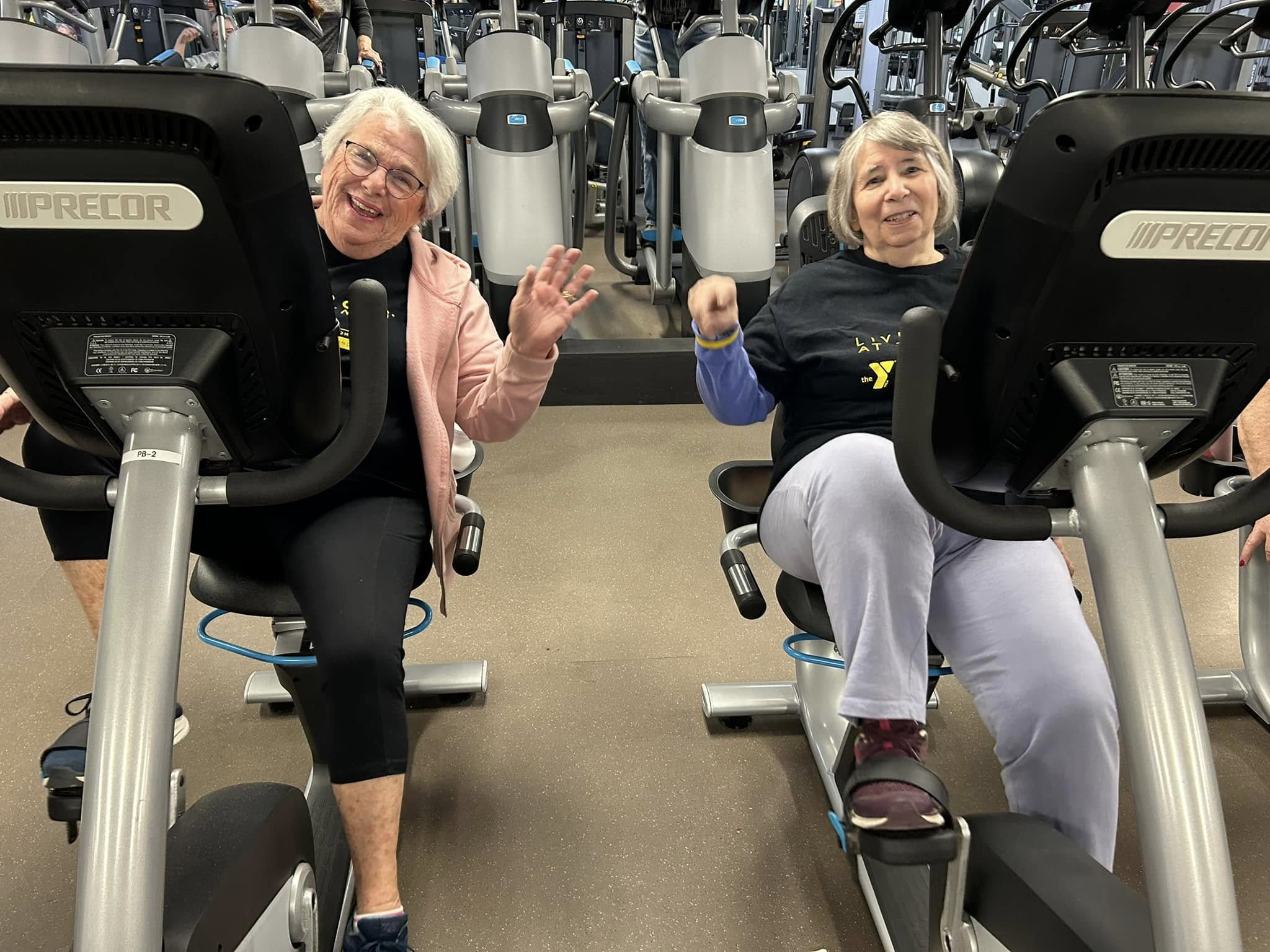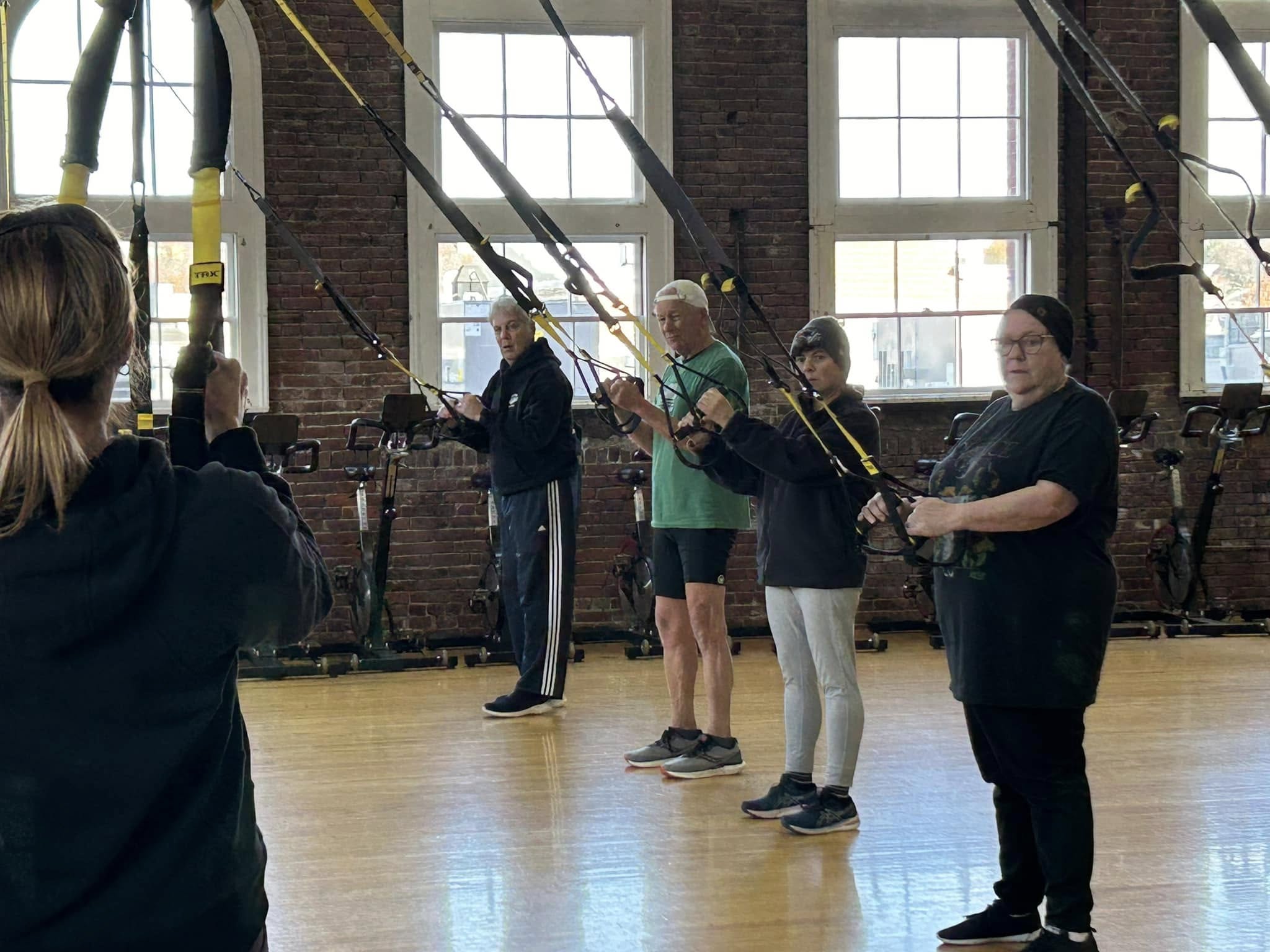YMCA's LiveSTRONG Program Promotes Fitness for Cancer Survivors
By Patrick DeVivo

Participants in the LiveSTRONG program
Photo Credit: Nancy Clover
The Melrose Family YMCA, with its historic building in the center of downtown, is a mainstay of community life. The YMCA provides a wide range of programs and services to people of all ages and needs. One of those is the LiveSTRONG program for cancer survivors, which offers support to individuals who have survived cancer and are looking to return to an active and healthy life.
The Melrose YMCA has partnered with the LiveSTRONG Foundation (formerly The Lance Armstrong Foundation) since 2016, says Bernadette Farrell, Senior Program/Health and Wellness Director for the Metro North YMCA. LiveSTRONG is a nonprofit organization with a mission to “make an immediate impact on the lives of people affected by cancer and seek out solutions to support quality of life today.” LiveSTRONG has developed a specific rehabilitation regimen for cancer survivors that it shares with YMCAs across the country.
Following a pilot program in 2016 where YMCA staff were trained in the LiveSTRONG format and goals, the YMCA ran two or three sessions a year until COVID forced the suspension of the program. Since resuming, the YMCA has rarely failed to have a waitlist of applicants for the 12 slots in each of the four 12-week sessions conducted each year.
Often, participants come to the LiveSTRONG program still suffering from the physical and psychological effects of their treatments and the persistent fear of their cancer returning. The program helps survivors rebuild their physical strength and endurance, while also helping boost their confidence and even provide a new perspective on life.

Photo Credit: Nancy Clover
According to data from the National Cancer Institute, the number of cancer survivors in the United States has increased significantly in recent years and is expected to continue rising. In 2001, approximately 9.8 million cancer survivors were living in the United States, representing 3.5% of the population. This number jumped to 18.1 million in 2022, or 5.4% of the US population.
Courtney Vernadakis has been the YMCA Program Manager for LiveSTRONG at the Melrose YMCA since 2021. Vernadakis and her colleague, Jeff Dodds, are both cancer survivors and fierce advocates for the program. Vernadakis is always moved when she sees a participant in the program get stronger through their hard work and with the support of their fellow survivors.
For Dodds, the program is a large part of his life. He estimates that he’s met 250-300 people during the time he’s worked for the program. “Of course, the most difficult part is when we lose someone,” he says. “There are times when someone works hard and makes progress, but the disease overtakes them, and they have no fight left.”
Four mentors - previous program graduates who stay in touch with the program and who assist during sessions and lend support and encouragement - make up the remaining staff.
A cancer diagnosis is the only qualification needed to enter the program, which draws most of its applicants through physician referrals. Participants are provided with an intake assessment and a final assessment at the time of their “graduation” so they can see their progress and the results of their hard work.
Program participants include a wide range of individuals, each with unique circumstances, from young parents in their 30s to single retirees in their 70s and 80s. According to Vernadakis, many are finishing up chemotherapy when they enter the program. They're often struggling with mental health and physically weak, and some are still coping with the loss of their hair and other changes to their appearance. The program also benefits participants who are years removed from their diagnosis.

Photo Credit: Nancy Clover
Each week of the program includes two 90-minute sessions, currently on Mondays and Wednesdays from 10:45 am to 12:15 pm. A typical session includes 30 minutes of cardiovascular exercises, followed by 45 minutes of strengthening activities, and wrapping up with 15 minutes of stretching. During the 12 weeks, participants are introduced to activities that they can take part in outside of the program, such as Tai Chi, Yoga, TRX, and even pickleball. Education on proper nutritional habits is also provided.
Proper use of gym equipment is another skill that participants can take from the program. “Most program participants have little experience using the exercise equipment in the gym,” says Vernadakis, “so it takes the first few sessions to learn how to get the most benefit from these machines. The typical participant takes about 4-6 weeks to develop a routine and to feel independent.” Vernadakis usually “sees a spark” at around 6 weeks, the point in the program when the participants gain more independence in their routines.
For Nancy Clover, the greatest encouragement comes from fellow participants. Nancy did the program a few years after her diagnosis, which she referred to as “a kick in the stomach.” She had never been one to exercise regularly before her diagnosis and treatments, but she felt that if she didn’t take advantage of the program when she did, then she never would. Still, by her own account, she was hesitant when she and her husband registered. Once in the program, Clover called it “life-changing.” Her cohort bonded beautifully. Group members supported and pushed each other and celebrated each other's milestones. For Clover, “LiveSTRONG is definitely the right name.”

Photo Credit: Nancy Clover
Christina Jurgens joined the program at the recommendation of her medical provider a few months after her chemotherapy treatments ended. She felt an urgency to “get my body in some semblance of shape.” Once the program started, she loved learning about new ways to exercise, which she admits she would have never known about. Jurgens complimented the trainers on the way they addressed the needs of each individual in the group. She, too, expressed profound appreciation for the support and encouragement given to her by her fellow participants. “In the end, she says, “the most important lesson is that cancer is not necessarily an end and, in fact, can be the beginning of a life of physical fitness and good health.”
If you would like to learn more about the Melrose LiveSTRONG program, contact cvernadakis@metronorthymca.org.

Follow Us: